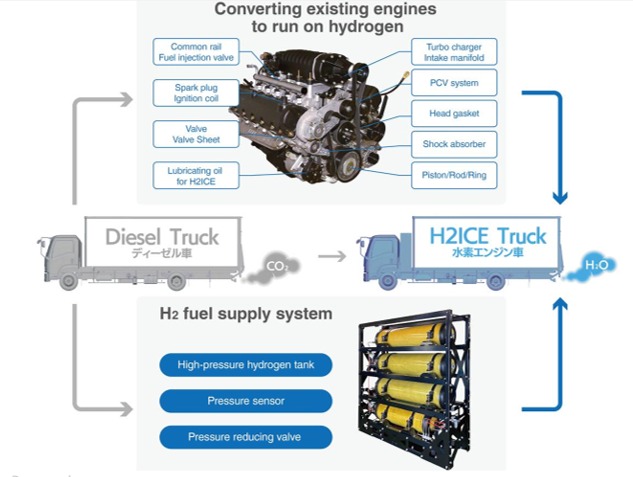iLabo Develops World’s First Hydrogen Engine Truck Conversion and Launches Study to Realize B-to-B Hydrogen Stations
i Labo is entrusted with a project by the Ministry of the Environment for the early reduction of CO2 emissions
(Head Office: Chuo-ku, Tokyo; President: Kimitaka Yamane; hereinafter “i Labo”) has applied for and been selected by the Ministry of the Environment for the “2021 Demonstration Project for Decarbonization of Heavy Duty Vehicles through the Use of Hydrogen Internal Combustion Engines” (hereinafter “the Project”).
In this project, diesel engine trucks running on diesel oil will be converted to hydrogen engine trucks running on hydrogen fuel, thereby reducing CO2 emissions to zero. The existing fuel supply components in the vehicle will be replaced with various components compatible with high-pressure hydrogen, including hydrogen tanks used in fuel cell vehicles, etc. In FY2023, the safety, practicality, and economic efficiency of the hydrogen engine trucks will be verified through cargo transportation in commercial operation.
In addition, we will verify the economic acceptability and conduct a feasibility study of hydrogen stations that supply hydrogen (“B to B type hydrogen stations”), mainly at truck terminals where many large commercial trucks operate.

■i Labo’s Goals
i Labo aims to convert more than 20,000 heavy-duty vehicles to hydrogen by 2050 through the following projects: design and prototyping of heavy-duty vehicle equipment, design and prototyping of engine hydrogenation, provision of hydrogen conversion process manuals and critical parts kits, and standardization of human resource development and skill certification in hydrogen conversion technology. This will enable the conversion of more than 240,000 heavy-duty vehicles by 2050. This is expected to generate a cumulative demand of more than 240,000 tons of hydrogen by 2050, while at the same time reducing CO2 emissions from trucks by a cumulative 1.04 million tons.
In addition to trucks, this technology will be applied to power generators, ships, heavy machinery, and construction equipment that emit large amounts of CO2 and require power (horsepower), such as power hungry enginesTM. We will contribute to the realization of a society in line with the SDGs (Sustainable Development Goals) set by the United Nations in 2030.